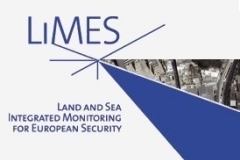LIMES (Land and Sea Monitoring for Environment and Security) is an Integrated Project co-funded by the European Commission within the 6th Framework Programme – Aeronautics&Space/GMES Security.
Realized in the years 2006-2010 this project involved around 50 Partners and around 20/25 main users.
LIMES goal was to define and develop prototype information services to support security management at EU and global level in the following thematic/policy areas of interest:
- Organization and distribution of humanitarian aid & reconstruction.
- Surveillance of the EU borders (land and sea).
- Surveillance and protection of maritime transport for sensitive cargo).
- Protection against emerging security threats (e.g. terrorism, illegal trafficking and proliferation of Weapons of Mass Destruction).
The services developed by LIMES aimed at supporting the building up of a common cooperation framework between the major EU research and operational actors on security management.

LIMES service development, focused on the use of Earth Observation technology and on its integration with satellite Telecommunication and Navigation capacity, aimed at providing information services in the following thematic/policy areas of interest:
- Maritime Surveillance: monitoring of both vessel and cargo movements for reasons of maritime safety, policing and border security both over coastal and open ocean areas. The services include Open, Coastal Water and Sensitive Cargo surveillance. The services are based on satellite Synthetic Aperture Radar and include the integration of other monitoring systems.
- Land and and Infrastructure Surveillance: includes Land Border Monitoring, Critical Infrastructure Surveillance, support to Event Planning and to Non Proliferation Treaty (NPT) monitoring. The services are based on the capacity of Very High Resolution satellites , used in conjunction with medium to high resolution data and aerial imagery, with the aim to assess risks, improve security and enhance preparedness.
- Humanitarian Relief and Reconstruction: includes the improvement and extension of the existing services that cover the whole crisis cycle. For Disaster Preparedness and Support of Reconstruction after a crisis, the information services will support population distribution and resource monitoring. For Operational Support of Humanitarian Relief, the fast provision of updated geospatial information and set up and validation of emergency satellite communication and navigation mobile systems are foreseen.

Planetek Italia was involved in the design and development of the "Common Info-Structure for Security".
The security domain needs to collect, combine and disseminate different sources of information. The information management in security domain can be characterized as follows:
- Information acquisitions are extremely heterogeneous in terms of sensors, access, information models, format, internal architectures, and technical implementation.
- Information resources are spread over many levels of organization (civilian, military, from local to national and to EU level) and cross-boundary use of information is very difficult.
- There are no common interfaces allowing cross-system search and exchange of information.
In response to these specific common requirements of security applications and users, the LIMES Common Info-structure should support the following activities: the establishment of networks between the users to share data; to standardize access to maps, satellite imagery and geographic information; to integrate data from different sources, images combined with GIS-generated background data; to increase access to up-to-date geospatial data; to enable rapid response by providing information to field security forces.
Users
- Coast Guards,
- Civil Protection Departments,
- Customs, Police Departments,
- National Armies,
- EU Agencies and DGs (e.g. FRONTEX, EUMS, DG RELEX, DG ECHO),
- UN Agencies (eg UNOCHA, UNHCR, WFP),
- NGOs






